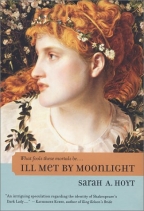Ill Met by Moonlight
Sarah A. Hoyt
Ace Books / Penguin Putnam
US Mass Market Paperback
ISBN: 0 441 00983 2
Pages: 304; Price: $5.99
Date Reviewed: 3rd February 2003
Reviewed by: Serena Trowbridge

REFERENCES
COLUMNS
|
|
|
Ill Met by MoonlightSarah A. HoytAce Books / Penguin PutnamUS Mass Market PaperbackISBN: 0 441 00983 2Pages: 304; Price: $5.99Date Reviewed: 3rd February 2003Reviewed by: Serena Trowbridge |
|
|
REFERENCES |
COLUMNS |
As someone who considers herself to be a bit of a Shakespeare buff, I approached this book with some trepidation. Over the last few years there have been many books, plays and films claiming to display an alternative source of Shakespeare's inspiration, but this is the first one to play with fact and fantasy in such an outrageous manner, using magical and other-worldly influences - and it works. It opens with a prologue adapted from Romeo and Juliet, but it is more A Midsummer Night's Dream, although Hoyt has retained some elements of romantic tragedy. The novel employs all the best tricks of the playwright, with tricks and illusion playing as large a part as in Shakespeare's plays.
The story opens with William Shakespeare looking for his wife, Nan, and eventually discovering that she has been captured by elves and taken to the palace of the elf king, Sylvanus, to nurse his child. Will tries to get her back, with the help or otherwise of the shape changing, Puckish Quicksilver and the remote and ghostly Ariel.
Love, loss and vengeance, all staples of Shakespeare's plays, are here, and of course the implication is that it is through this experience that the playwright is inspired and begins to learn his craft. It even turns out that Christopher Marlowe was once a lover of Quicksilver, who as a man/woman and briefly the lover of Shakespeare fits neatly into the mould of the Dark Lady; the academics guessing if the Dark Lady was really a man never suspected that really it was a gender-bending elf. Quicksilver's desire for revenge on the death of his parents, Titania and Oberon, provides another useful parallel for Shakespeare's plays, but somehow the emotions engendered are not always conveyed effectively to the reader.
The basis of the plot allows for a fairly successful allusiveness - for example when Pyrite, a noble of the elven court, says "Ask for me tomorrow and you shall find me a grave man", we can draw certain conclusions about his character based on what we know of the treacherous Tybalt. Some, however, might object to the idea that the Bard lifted his best lines from Fairyland rather than the depths of his imagination as previously assumed.
Somehow "Ill Met By Moonlight" manages to write about a world of magic without being magical; the fantasy blended with politics, gender issues and playfulness that are the hallmark of "A Midsummer Night's Dream" are sadly not captured as well as they might be here. It's a good idea for a novel, but sometimes Hoyt seems to struggle with the language, which ends up as an odd and stilted mixture of archaic terms and modern usage; for example "Was it glamoury that made Will's heart tender, like a freshly skinned knee" brought an untimely smile to my face.
On the whole, it's not bad, but too slight, and I was disappointed that with the rich material of Shakespeare's work to play with the plot remains essentially weak. Still, as in the best traditions of Elizabethan theatre, it does end with a royal wedding and a number of glittering costumes!